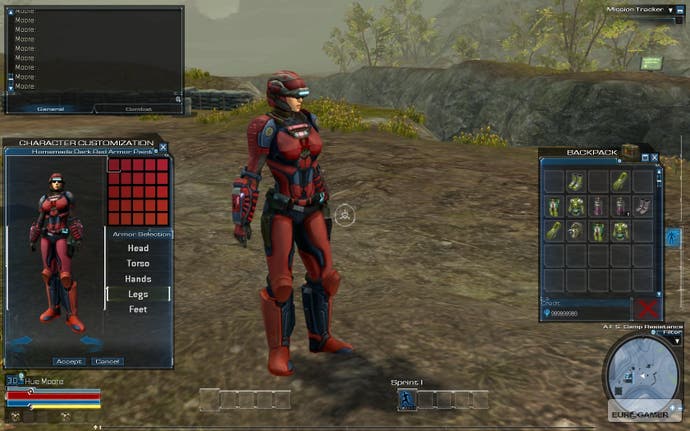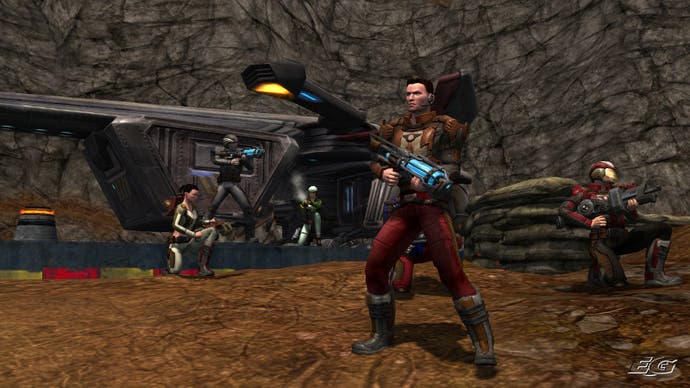Tabula Rasa
Richard Garriott on breaking the MMOG mould.
Garriott plans to fix that by turning Tabula Rasa in to a game with elements of "run and gun" - although he's at pains to point out that he's not making a massively multiplayer arcade action game. The beating heart of Tabula Rasa is still a stats-based RPG, but it now boasts a heavy focus on positioning, cover and even locational damage - all of which are elements far more commonly found in action games.
The first striking change you notice about the game's interface, as a result, is that it doesn't have a toolbar full of spells and abilities. Instead, your character has a weapon equipped which is fired using the left mouse button, and a special ability on the right mouse button. It's incredibly minimal, and focuses you on the task at hand - keeping the right enemy in your sights, finding appropriate cover, and even dodging more powerful attacks.
This doesn't result in the kind of fast-paced FPS action which would have the average MMOG player running for the hills, however. Instead, Tabula Rasa looks like it is successfully striking a balance which maintains the appeal of stat-based combat, while pushing players gently towards more immersive, 3D gameplay - forcing them to think about positioning and strategy without fundamentally breaking the basic systems of an RPG.
Class War
The game has also torn up the rule book regarding character progression and levelling up - but once again, the changes made end up looking like an intelligent rethink rather than a desperate attempt to be different.
Garriott is critical of the games which force you to repeat the grind of the first few levels every time you want to try out a new character class, so Tabula Rasa uses a specialisation tree instead. As you progress, you gradually narrow down your character's abilities to create a specific class - but unusually, you can also save the status of your character at any point in the game.
That saved status can then be "cloned", and popped into the game as a completely new character. So, if you have a level 30 character and are presented with three branches of the class tree to choose from, there's nothing to stop you cloning yourself twice and trying out all three branches - or saving your status, and coming back and doing so at a later date.

It's a powerful approach to character classes which will give players far more freedom to explore every aspect of the game. To facilitate it, the team has also decided that all your characters will have a single shared inventory - another unusual decision but one which should prevent players from having to mess around with work-arounds like a "bank" character.
The dynamic battlefield environments are another aspect of the game of which Garriott seems very proud. The idea is that the battle will ebb and flow regardless of whether players are participating or not - so game areas will never have the sort of static, eternal, scripted battle lines found in World of Warcraft and its ilk.
Instead, you'll find the battle lines being pushed back and forth constantly - even to the extent that entire bases and settlements will change hands frequently. This will, of course, rob players of the merchants, facilities and even quest-givers from those settlements - meaning that they'll need to wrest them back from the Bane if they want to enjoy those advantages again.
Starting Fresh

The extent of Tabula Rasa's ambition is hugely impressive - admittedly a double-edged sword for an MMORPG, where ambition can often be unrealistic due to technological or design constraints. However, Garriott and his team are confident in delivering what they've promised. With the game in closed beta now, our first impression is certainly that they are making good on the promise of a game which upsets the fundamentals of the MMO genre. (And you can see for yourself how they're doing by signing up for that closed beta - we're the exclusive UK partner, and details are elsewhere on the site.)
"If nothing else, Tabula Rasa has at least shown that there are other powerful tools that we can put in the arsenal of MMOs - which I think will be successful not only for Tabula Rasa," Garriott explains.
"No game is perfect, no game is the be all and end all of all games - and not only will we improve on this feature-set, as we learn to work with it, as players give us feedback and we expand on it, but I think that other teams will also do similar kinds of experiments."
"It won't necessarily the same features - but finding a way to make the combat more fast paced. Finding a way to get people out of the level grind and into thinking tactically, and immersively... I'm hoping that Tabula Rasa helps push things in a different direction."
Tabula Rasa is in closed beta now, and you can apply for a key through Eurogamer. An open beta is set to begin in the next few months. It's due out later this year.


